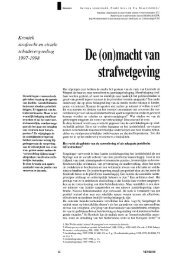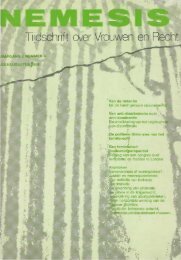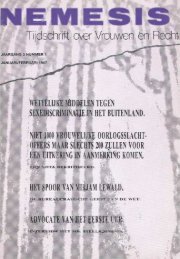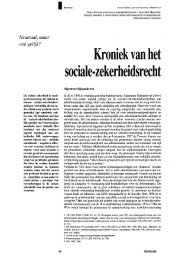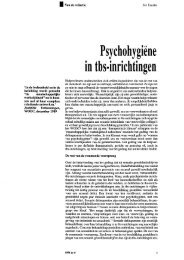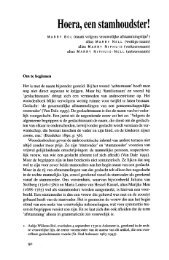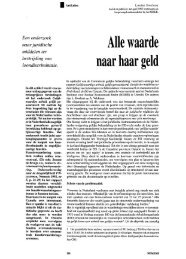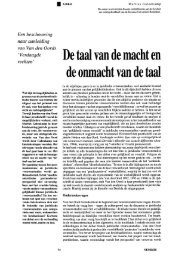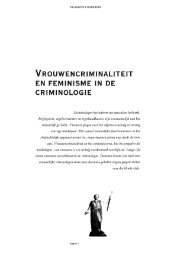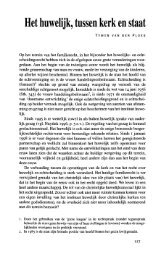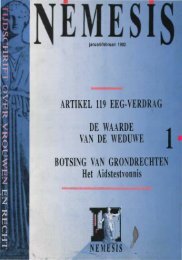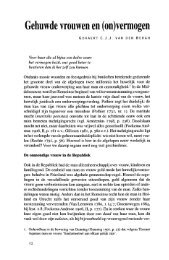(2001) nummer 1 januari/februari - Nemesis
(2001) nummer 1 januari/februari - Nemesis
(2001) nummer 1 januari/februari - Nemesis
You also want an ePaper? Increase the reach of your titles
YUMPU automatically turns print PDFs into web optimized ePapers that Google loves.
crimination against women, as well as<br />
the disadvantages, obstacles and difficulties<br />
women face in the full exercise<br />
and enjoyment of their civil, political,<br />
economie, social and cultural rights on<br />
grounds of race, colour, descent, or national<br />
or ethnic origin.<br />
4. Accordingly, the Committee, when<br />
examining forms of racial discrimination,<br />
intends to enhance its efforts to integrate<br />
gender perspectives, incorporate<br />
gender analysis, and encourage the<br />
use of gender-inclusive language in its<br />
sessional working methods, including<br />
its review of reports submitted by<br />
States Parties, concluding observations,<br />
early warning mechanisms and<br />
urgent action procedures, and general<br />
recommendations.<br />
5. As part of the methodology for fully<br />
taking into account the gender related<br />
dimensions of racial discrimination,<br />
the Committee will include in its sessional<br />
working methods an analysis of<br />
the relationship between gender and<br />
racial discrimination, by giving particular<br />
consideration to: a) the form and<br />
manifestation of racial discrimination;<br />
b) the circumstances in which racial<br />
discrimination occurs; c) the consequences<br />
of racial discrimination; and d)<br />
the availability and accessibility of<br />
remedies and complaint mechanisms<br />
for racial discrimination.<br />
6. Noting that reports submitted by<br />
States Parties often do not contain specific<br />
or sufficient information on the<br />
implementation of the Convention with<br />
respect to women, States Parties are requested<br />
to describe, as far as possible in<br />
quantitative and qualitative terms, factors<br />
affecting and difficulties experienced<br />
in ensuring for women the equal<br />
enjoyment, free from racial discrimination,<br />
of rights under the Convention.<br />
Data which has been categorized by<br />
race or ethnic origin, and which is then<br />
disaggregated by gender within those<br />
racial or ethnic groups, will allow the<br />
States Parties and the Committee to<br />
identify, compare and take steps to<br />
remedy forms of racial discrimination<br />
against women that may otherwise go<br />
unnoticed and unaddressed.<br />
WETGEVING<br />
Security Council, Resolution<br />
1325 (2000) on the adoption of<br />
a gender perspective<br />
United Nations, Press Release<br />
Security Council<br />
4213th Meeting<br />
31 October 2000<br />
The Security Council this afternoon<br />
called on all actors involved in negotiating<br />
and implementing peace agreements<br />
to adopt a gender perspective<br />
that included the special needs of<br />
women and girls during repatriation<br />
and resettlement, rehabilitation, reintegration<br />
and post-conflict reconstruction.<br />
Such a gender perspective would also<br />
include measures that supported local<br />
women's peace initiatives and indigenous<br />
processes for conflict resolution,<br />
and that involved women in all the implementation<br />
mechanisms of the peace<br />
agreements, as well as measures to ensure<br />
the human rights of women and<br />
girls, particularly as they related to the<br />
constitution, the electoral system, the<br />
police and the judiciary.<br />
The Council took that action when it<br />
unanimously adopted Security Council<br />
resolution 1325 (2000), by which it also<br />
expressed willingness to ensure that<br />
Security Council missions take into account<br />
gender considerations and the<br />
rights of women, including through<br />
consultation with local and international<br />
women's groups.<br />
Reaffirming the important role of<br />
women in the prevention and resolution<br />
of conflicts and in peace-building,<br />
the Council requested the Secretary-<br />
General to pro vide to Member States<br />
training guidelines and materials on the<br />
protection, rights and particular needs<br />
of women, as well as on the importance<br />
of involving women in all peacekeeping<br />
and peace-building measures. It invited<br />
Member States to incorporate<br />
those elements, as well as HIV/AIDS<br />
awareness training, into their national<br />
training programmes for military and<br />
civilian police persönnel in preparation<br />
for deployment.<br />
Also by the resolution, the Council invited<br />
the Secretary-General to carry out<br />
a study and report to it on the impact of<br />
armed conflict on women and girls, the<br />
role of women in peace-building and<br />
the gender dimension of peace processes<br />
and conflict resolution.<br />
The Council urged Member States to<br />
increase the participation of women at<br />
decision-making levels. It urged the<br />
Secretary-General to appoint more<br />
women as special representatives and<br />
envoys to pursue good offices on his<br />
behalf. In that regard, the Council<br />
called on Member States to provide<br />
candidates to the Secretary-General for<br />
inclusion in a regularly updated centralized<br />
roster.<br />
Further, the Council urged the Secretary-General<br />
to expand the role of<br />
women in United Nations field-based<br />
operations, especially among military<br />
observers, civilian police, human rights<br />
and humanitarian persönnel. It requested<br />
the Secretary-General to include, in<br />
his reporting to the Council, progress<br />
on gender mainstreaming throughout<br />
peacekeeping missions and all other aspects<br />
relating to women and girls. Expressing<br />
concern that women and children<br />
accounted for the majority of<br />
those adversely affected by armed conflict,<br />
the Council called on all parties to<br />
armed conflict to protect women and<br />
girls from gender-based violence. It<br />
emphasized the responsibility of all<br />
States to end impunity and to prosecute<br />
those responsible for genocide, crimes<br />
against humanity, and war crimes, including<br />
those relating to sexual violence<br />
against women and girls.<br />
The meeting, which began at 12:15<br />
p.m., was adjoumed at 12:16 p.m.<br />
Today's meeting folio wed an open<br />
meeting last week on 24 and 25 October,<br />
on women and peace and security.<br />
In that meeting, Assistant Secretary-<br />
General and Special Adviser on Gender<br />
Issues and Advancement of<br />
Women, Angela E. V. King, and a number<br />
of other speakers stressed the need<br />
to include women in every aspect<br />
of peace-building initiatives. Speakers<br />
specifically called for women's<br />
involvement in decision-making<br />
processes.<br />
Resolution<br />
The full text of the resolution, adopted<br />
this afternoon as Security Council resolution<br />
1325 (2000) reads as follows:<br />
The Security Council,<br />
Recalling its resolutions 1261 (1999)<br />
of 25 August 1999, 1265 (1999) of 17<br />
September 1999, 1296 (2000) of 19<br />
April 2000 and 1314 (2000) of 11 August<br />
2000, as well as relevant statements<br />
of its President and recalling also<br />
the statement of its President, to the<br />
press on the occasion of the United Nations<br />
Day for Women's Rights and International<br />
Peace of 8 March 2000<br />
(SC/6816),<br />
NEMESIS <strong>2001</strong> nr. 1 23



